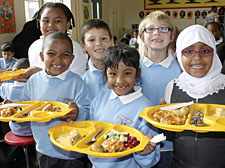| |

Pupils at Ambler Primary School in Blackstock Road prepare to tuck into their free meals |
No such thing as free school meal
Free school meals for every primary school pupil sounds attractive. But there is a price to be paid, warns John Gilbert
I AM proud to be the latest in the long line of Lib Dem finance chiefs on Islington Council. In the 10 years we have run the council, inflation has risen by 29 per cent but we have kept council tax rises to just 21.5 per cent, compared with an average rise of 61 per cent across London and 77 per cent nationally.
Over those 10 years we have improved council services beyond recognition. Ten years ago government inspectors regularly ranked Islington’s services as “poor”. Earlier this year, we shared the Audit Commission’s highest ranking of “four stars and improving strongly” with just 25 other councils nationwide.
I cannot claim this is all down to the council’s political leadership. We owe much to our strong team of dedicated and highly professional council officers. However, competent political leadership setting the right priorities and willing to take hard, sometimes unpopular decisions is an essential element. Without it these achievements would not have happened.
What has all this got to do with free school meals? Giving every primary school pupil in the borough a free school lunch sounds attractive, but it costs money. Last year’s Labour budget put Islington council tax up by the highest amount in Inner London to fund a partial introduction of free school meals. The full roll-out to all primary schools will cost more than £3million every year, equivalent to a council tax rise of about 4 per cent. Are free school meals the best use of our scarce resources, especially just after the worst financial crisis since the 1930s?
My answer is a resounding “no”. Poor nutrition is a problem in our schools but it is more of a problem in secondary schools than in primaries. Secondary pupils often leave the school premises to buy chips and sweets at lunchtime rather than eating proper meals. Wouldn’t it be a better use of the council’s subsidy to give them a nutritious alternative? I’m sure many will still want to go out, but at least they’ll go with their stomachs lined with decent food.
Who are the primary pupils who will benefit from free school meals for all? In Islington, multi-millionaires live alongside real poverty. Our primary schools have improved enormously and it is common for people who can afford private education to send their children to local primary schools before they go off to expensive fee-paying secondary schools outside Islington. Is our council taxpayers’ money best used providing free school meals for children of these wealthy families?
I agree that the income levels to qualify for free school meals under the national scheme are too low. Paying for school meals causes hardship for people who just fail to qualify, but shouldn’t we target help to people who need it rather than giving it to those who plainly don’t?
Finally, there are the 20 per cent of Islington primary school pupils who live in Hackney, Haringey and Camden while a similar number of our children go to school in their boroughs – Islington is a small place and most schools are close to a borough boundary. This policy might make some sense if it were introduced across all neighbouring boroughs but it makes no sense at all for Islington families to pay higher taxes so Hackney kids attending our schools get free meals while our kids who go to Hackney schools have to pay in full. This is the effect of Labour’s free school meals plan.
It’s superficially attractive, but it’s a bad use of money that will lead back to the dreadful mismanagement of when Labour used to run Islington. That’s why I oppose it.
|
 |
|
|
 |
| |
| |